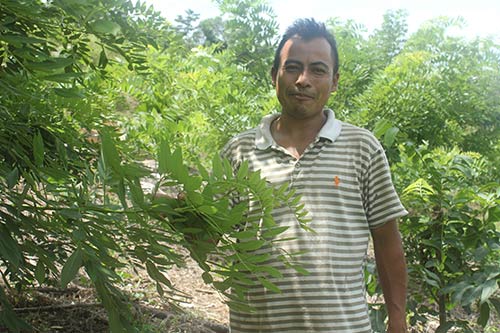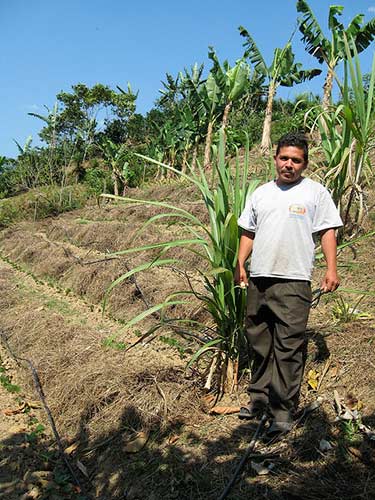By Karim Slifka
The roads leading to La Majada and Brisas del Mar, Santa Barbara, paint a stark contrast to Honduras’ large cities. Urban noise and pollution give way to the peace and quiet of rural hillsides. Before long, however, evidence of massive deforestation emerges. Decimated mountain slopes have caused mudslides, soil erosion and water contamination. Flooding and drought are occurring more often. This is the land where Francisco “Chico” Garcia of Brisas del Mar and Noe Garcia of La Majada live and farm.
Chico and Noe have noticed the changes in their environment and climate. Noe says, “The rains do not come when they used to. My father could predict the arrival of rain and knew when to plant our beans and corn to the exact day. Now, it is changing in unpredictable ways. If we plant when our fathers did, we lose all of our beans.”

Their needs mirror the needs of most rural farming communities in Central America. Traditional slash-and-burn farming practices have steadily eroded their environment and way of life, creating a destructive cycle that decreases land productivity each year and pushes farmers to clear still more forest. To reverse these trends, local families have sought an alternative method of farming that preserves local habitat, water supplies and livelihoods.
Sustainable Harvest International (SHI) began its work conserving micro-watersheds and reforesting degraded lands in 1997, right here in Honduras. Florence Reed founded SHI after serving as a Peace Corps volunteer in Panama, where she witnessed the devastation that slash-and-burn farming inflicts on families, communities and the planet. Her years of dedication to sustainable agriculture initiatives in Honduras — and later in Panama, Belize and Nicaragua — earned her the National Peace Corps Association 2012 Sargent Shriver Award for Distinguished Humanitarian Service.
SHI has converted 16,000 acres of degraded land to sustainable farms, planted more than 3.2 million trees and helped roughly 2,100 families become self-sufficient stewards of the environment since 1997. SHI also estimates that these families are now teaching 14,700 more families how to replicate their success.
SHI’s five-phase program — family selection, orientation and planning; introduction to nutrition, organic farming and crop diversification; advanced crop diversification and introduction to business; identifying markets and strengthening entrepreneurial skills; and family graduation — emphasizes long-term assistance that recognizes the relationship between culturally and ecologically sensitive development. During each of the five phases, SHI evaluates participant families and staff to determine program effectiveness and progress toward achieving environmental sustainability and a decent standard of living. SHI’s programs succeed only when participating farmers become committed stewards of their environment.

Amanda Zehner, SHI smaller world and field coordinator, explains, “When asked about the meaning of projects such as improving wood-burning stoves, planting trees, ending slash-and-burn farming or shifting from chemical to organic agriculture, successful SHI participants express a newly found harmonious relationship with their environment and the tie between personal and environmental health. They also describe the empowerment and community building that comes from families learning and working together to protect and conserve the natural resources on which they all depend.”
SHI received a boost five years ago when American Forests Global ReLeaf began supporting its efforts. Reforestation has been integral to the move toward sustainable agriculture in Santa Barbara, where diverse forest plantations provide food and income while protecting soil, water, habitat and the climate. From July to September 2012, participants in SHI and American Forests’ Global ReLeaf projects in Honduras planted nearly 30,000 hardwood and coffee trees, covering more than 50 acres.
Beyond what numbers can show, however, sustainable agriculture has changed the very essence of farming, food and life for these communities. Chico Garcia grew up working as a day laborer on a farm he didn’t own. When SHI-Honduras began work in his community, Chico took out a loan to buy some land just so he could participate. Chico learned how to work with the land and developed a relationship with his environment that drives everything he does. As time passed, he bought the forest across the valley to protect a water source vital to his community. Chico also became community president of the SHI group in Brisas del Mar, inspiring others to buy forestland adjoining the piece he bought in order to preserve more of the watershed.
Now in SHI’s Phase 3, Chico is committed to conserving and reforesting the land: “My understanding of my place in the world is different now. I want to live a healthy life and that includes my family and my environment. After working with SHI, I now know and value this important system.” Noe Garcia, also in Phase 3, shares a similar revelation: “Before working with SHI, we would cut down all the trees and did not understand how important they were for us and our environment. We didn’t have this consciousness. Now, I want to take care of the trees and give back what I take so we are all healthy.”
Santa Barbara in Honduras has experienced a renewal, as have the farmers, like Chico and Noe, who live there. As much as the work of SHI is vital to the preservation of our planet’s forests, it is these local farmers who carry the message forward and become enduring community leaders in reforestation and sustainability.
Karim Slifka is SHI’s development and outreach coordinator. She writes from Surry, Maine.